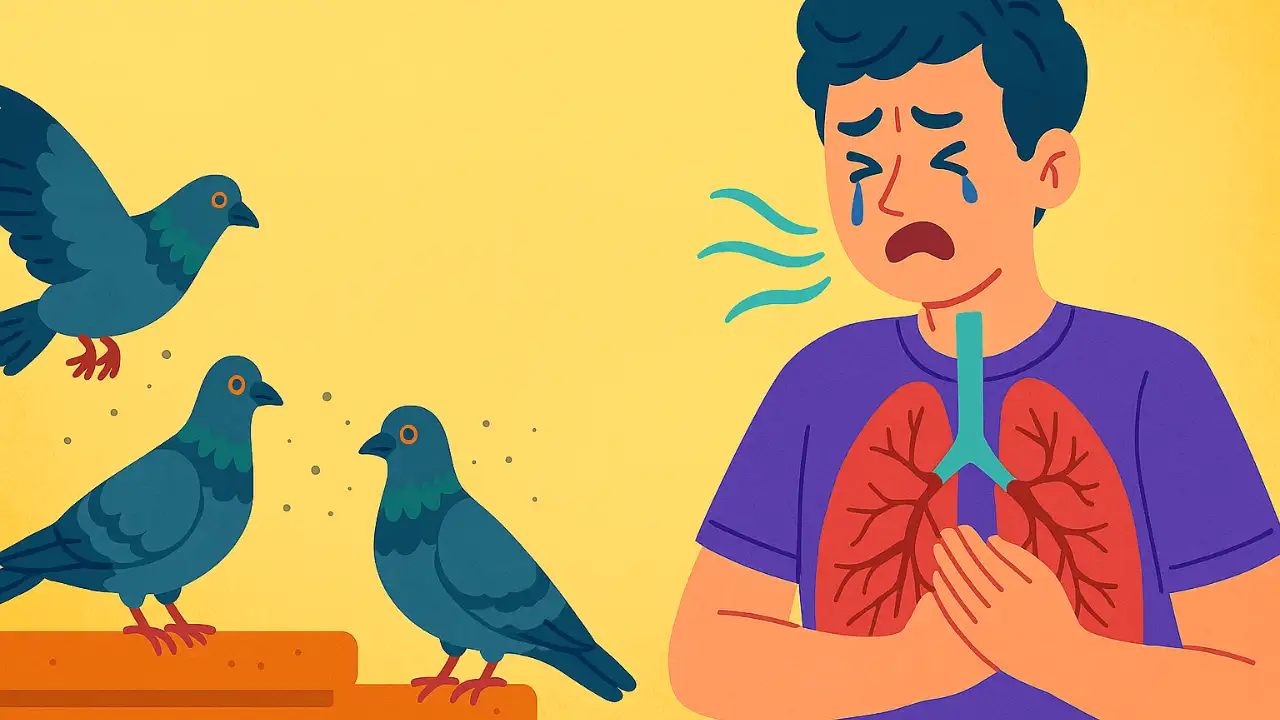
Lung Failure Due to Pigeon Menace (Photo: AI Generated)
Pigeons may appear to be harmless fixtures of urban life, but behind their peaceful cooing lies a significant health hazard few are aware of. Doctors warn that the seemingly innocuous contact with pigeons, especially their feathers and droppings, could be triggering a dangerous lung condition that goes unnoticed until it becomes life-threatening.
Hypersensitivity Pneumonitis, aka Bird Fancier’s Lung
According to Dr Ravindra Sanglikar, Consultant Pulmonology, KIMS Hospitals, Thane, a growing number of Indians are falling seriously ill each year due to repeated contact with pigeons. “The minute dust from pigeon droppings and feathers tends to produce an illness called hypersensitivity pneumonitis,” he says. “It gradually damages the lungs, making breathing increasingly difficult and, eventually, leading to lung failure.”
Histoplasmosis and Cryptococcosis
Another hidden risk is fungal infections such as histoplasmosis and cryptococcosis, which are especially dangerous for immunocompromised individuals. “Some patients may present with flu-like symptoms like cough, fever, chills, and shortness of breath,” Dr. Chanchalani explains. “If exposure continues, the chronic form can develop, leading to permanent lung scarring.”
Warning Signs
What makes this condition so dangerous is its deceptive nature. The early warning signs like persistent cough, shortness of breath, chest pain, and constant fatigue, can often be mistaken for asthma or simple allergies. Many people do not seek timely medical help, allowing irreversible damage to progress silently.
Hypersensitivity pneumonitis is also known as Bird Fancier’s Lung. Repeated exposure to pigeon feathers or droppings can start an immune reaction, leading to inflammation in the airways and lungs. “This can progress to long-term complications like lung fibrosis and, in severe cases, even lung transplants,” Dr Gunjan Chanchalani, Director, Critical Care Medicine, Wockhardt Hospitals, Mumbai Central, warns. Patients typically present with a dry cough and severe tiredness, which may eventually progress to breathlessness even at rest.
Precaution Is Protection
The good news? These risks can be managed with simple preventive steps. Dr Sanglikar recommends wearing gloves and a mask while cleaning pigeon-affected areas and avoiding dry sweeping, which can stir up hazardous dust. “Dampen surfaces first, then wipe them clean. Keep windows shut or install fine mesh screens, and remove food sources or block nesting spaces,” he advises.
Dr Chanchalani also urges people to stay alert. “If you are getting repeated flu-like illnesses or are feeling excessively tired with reduced exercise capacity or a persistent cough, you should see a doctor immediately and mention any possible contact with pigeons,” she says. “Most healthy individuals may not be affected, but it is wise to take precautions.”
In a country where many lung failure cases are reported annually, awareness about such silent environmental risks is crucial. A landmark study published in the Journal of Infection and Public Health warns that urban pigeon populations can act as reservoirs for emerging pathogens and potentially spark future epidemics.
